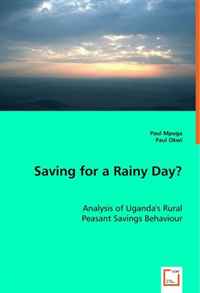We use farm household data from the Uganda household surveys for 1992/93, 1995/96, 1996/97 and 1999/2000 to examine peasant household saving behaviour in the face of shocks. We find that the size of land owned, level of education of household members, educational level of the household head, and variation in rainfall determine household income and savings. Uganda"s peasant households are forward looking: they save relatively large proportions of their transitory income. The results suggest that households use savings to buffer consumption, with the implication that temporary shocks to income may not significantly affect household welfare. This is an important consumption smoothing mechanism for the peasant households in the rural areas of Uganda where financial institutions are absent. Это и многое другое вы найдете в книге Saving for a Rainy Day?: Analysis of Uganda's Rural Peasant Savings Behaviour (Paul Mpuga)
Saving for a Rainy Day?: Analysis of Uganda's Rural Peasant Savings Behaviour Paul Mpuga (книга)
Подробная информация о книге «Saving for a Rainy Day?: Analysis of Uganda's Rural Peasant Savings Behaviour Paul Mpuga». Сайт не предоставляет возможности читать онлайн или скачать бесплатно книгу «Saving for a Rainy Day?: Analysis of Uganda's Rural Peasant Savings Behaviour Paul Mpuga»















